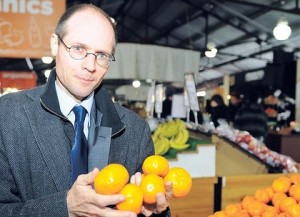If international trade and aid won’t fix hunger and bad nutrition, what will?
Jo Chandler, June 19, 2013
Professor Olivier De Schutter. Photo: Mal Fairclough
THE ”silent tsunami” of the global food crisis was at the height of its frenzy, emptying market stalls and cooking pots, spiking prices, stirring riots and shaking governments, when in May 2008, Professor Olivier De Schutter began work as the United Nations’ Special Rapporteur on food.
The Belgian human rights lawyer recalls he took up his mandate ”when the headlines were about food riots in some 30 countries, when prices of maize and wheat had skyrocketed”.
Even before the 2007-08 triple-whammy of food, fuel and financial crises, the World Bank estimated 1.1 billion people were living on less than $1 a day, and 933 million were undernourished.
Then a diabolical conflation of factors – shrinking crop stockpiles, the First World thirst for biofuels and commodities speculation – sent food prices soaring. Between January and April 2008 the price of rice ( the daily staple of much of the world’s population) rose more than 140 per cent.
The long era of cheap food was over. The world’s poorest households were sucked into the vortex of abject poverty and food insecurity. The fallout was often difficult to measure, but studies in some of the hardest-hit nations later identified increases in acute malnutrition in the order of 50 per cent among poor children aged under five, large numbers of them also vanishing from classrooms forever.
Even when food prices settled, these children’s prospects were lost and those of the next generation already deeply compromised.
These children were not the casualties of natural disaster, says De Schutter. After more than four years on the frontline of the international fight for food security, and as another devastating famine takes shape in the parched Sahel region of Africa, the UN food guru’s central mantra is that hunger is not the inevitable consequence of drought, or flood, or pestilence.
Rather, he insists, hunger remains as an enduring political problem, one with clear political solutions. And their moment has arrived.
”We are finally learning the lesson taught to us by (Nobel prize-winning Indian economist) Amartya Sen 30 years ago, that access to food and the right to food was about empowerment, participation and accountability”, and not only about strategies that would improve yields or open trade routes, he says.
On his first Australian visit – Professor De Schutter is in Melbourne this week as a guest lecturer in Monash University’s human rights program – the man charged by the UN with securing recognition of the right to food for all the world’s citizens brings a message that this ambitious mission is not beyond hope.
What is required to achieve the right to food is now well understood, he says. The uncertainty is in the gap between the knowing, the saying and the doing, and that’s what will be tested in forums like the G20 summit now getting under way in Mexico and the UN Rio+20 looming behind it.
The case for hope, he argues, is founded on the hard-won knowledge that emerged from the food crisis. It is articulated in the belated recognition by governments, economists and institutions of the systems that conspire to take food from the mouths of the world’s poor. ”We’ve committed many mistakes, which governments are now trying to correct.”
Whether he can actually be said to be hopeful is more complicated.
Olivier De Schutter is the Harvard-educated son of a Belgian diplomat who has spent much of his life shifting between the world of privilege and the world of need. His youth was spent in developing countries, exposed to the ”very visible poverty in the streets of Mumbai (then Bombay), where I grew up”. Later he lived in Jeddah, Saudi Arabia, and in Kigali, Rwanda, before returning to Belgium for high school and to study law.
Exposure to ”extreme wealth and extreme poverty, when you’re a kid, does provoke a sense of guilt and, yes, a sense of duty to compensate for a hyper-privileged background”.
Before taking up the role as UN Special Rapporteur on the right to food he was secretary-general of the International Federation for Human Rights, working primarily on issues of economic, social and cultural rights.
His UN role put him on a steep learning curve, requiring an understanding of development economics and the political economy of food systems, as well as issues of agronomics, nutrition and health.
”As a lawyer, my bias is to look at questions of accountability, power, and participation. That is, after all, the core of what the right to adequate food as a human right is about.”
This bias emerges as the right fit for the times, reflecting the transformation now under way in the politics and understanding of food in the wake of the 2008 crisis.
De Schutter says modern agriculture has evolved through two critical phases, and is perched on the brink of a third defining paradigm shift. In the 1960s and 1970s, in response to concerns about population growth, the emphasis was on using technology to end hunger – the ”Green Revolution”.
”The idea was really to respond to what was seen as an emergency – to feed growing populations by boosting outputs – using improved varieties of seeds, fertilisers, pesticides, irrigation, mechanisation.”
The investment worked, reaping higher yields, increasing the calories available per capita. But the success was largely enjoyed by farmers with capital, access to credit and secure land title – mid-to-large-scale operators able to make the investments. Smaller-scale farmers, many of them women, remained at the margins.
”The result was that we had increased food availability, but at the same time we had increased poverty and inequity,” De Schutter says.
Many small farmers, unable to compete or to afford expensive seed and fertilisers, were forced from their land and joined the urban poor.
”Now we realise it has been a mistake to look at the reduction of hunger and malnutrition as just a technical problem, one of increasing yields and productivity; what matters is who produces, at what prices, and who benefits and loses from shifts in agricultural prices.”
The next phase was to encourage developing countries to open their markets to imports and exports in order to increase their access to foreign currencies and invest back into agricultural systems and technologies.
”The hope of the 1980s was that trade liberalisation would stimulate increased production and reward farmers for their work” – that food would flow from fields of plenty to regions of scarcity.
But, says De Schutter, ”it turns out this has not worked because food travels where the purchasing power is highest, not where the need exists.”
Once again it was the better-off farmers, those with land and capital, who reaped the benefits of producing for global markets. Meanwhile, investment in local food systems languished. Farmers growing crops such as sorghum, millet and sweet potato for local consumption struggled.
”Gradually traditional diets were abandoned by urban populations, which came to rely on imported, often processed foods,” De Schutter says. Meanwhile successful farmers devoted their land and energies to crops for export such as cotton, tobacco and coffee.
The consequence is that the average least developed country today imports between 25 and 27 per cent of its food, rendering populations extremely vulnerable to price shocks such as those which played out in 2008 and 2010.
Since the carnage of the food crisis, the voices of struggling small-holder farmers – the hand-to-mouth-to market women (the dominant workforce) and men at the bottom of the food chain – have gained volume and recognition, with the emergence of farming co-operatives and networks such as the Via Campesina movement representing peasant farmers from around the world.
They have championed the idea of food sovereignty – that is, the right of farmers to determine and sustainably grow the crops that best meet their needs – as critical to genuine food security. The argument has gained traction, De Schutter says, although it still holds a whiff of anti-trade ”taboo” in the upper reaches of the agricultural and economic institutions
”What they were saying was that we were wrong in believing that trade and food aid were the solutions to hunger and bad nutrition,” says De Schutter. ”We now realise the only reasonable attitude is to support these countries in their efforts to feed themselves better, and to reinvest in local agriculture systems which had been destroyed by 30 years of trade liberalisation.”
That is the very important shift. ”In that, there is much to rejoice – at least at the level of rhetoric,” he says.
And there’s the kicker: the critical question of the willingness of all players – political leaders, private enterprise, public institutions – to do what is required to overhaul food systems to deliver food where it is most needed.
Adding to the complexity are new factors – rising demand for biofuel crops, climate shocks and uncertainty as a consequence of global warming, commodities speculation on the back of price volatility, land grabbing, the rise of middle-class appetites and burgeoning population.
A paradigm shift in the political and economic mindset is real and significant, De Schutter says. The turning point was explicit when, in the wake of the food crisis, at the 2009 summit in L’Aquila, Italy, the G8 agreed to commit $22 billion in public financing for food security.
He says L’Aquila articulated a new understanding of hunger and the need to provide capacity for countries not just to contribute to international trade, but to feed themselves.
But only about half of the promised funds have so far materialised, raising the question of ”whether the actual commitments and finance will follow”.
What we see now are two different stories on agriculture developing in parallel, says De Schutter.
”In one story, governments adopt resolutions at international summits on the need to support small-scale farmers and reinvest in crops to feed local populations.”
This story recognises the role of food sovereignty so that not all investment and infrastructure is focused on large-scale production of export crops. It also explores emerging understanding of ecosystems to find new integrated food production models that are less dependent on fossil fuels, more nutritious and more sustainable.
”Then we have what is actually happening on the ground – more land concentration [in fewer hands], more private investment in large-scale agriculture, more expensive technologies emerging which only better-off farmers will be able to afford in the long term.
”Then we have what is actually happening on the ground – more land concentration [in fewer hands], more private investment in large-scale agriculture, more expensive technologies emerging which only better-off farmers will be able to afford in the long term.”
”So I fear that unless we explicitly address this mismatch, this misalignment between the economic incentives and the political pressure, we will fail in what we promise to achieve.”
Jo Chandler is a senior writer.
Olivier De Schutter will deliver the 2012 Castan Centre for Human Rights Law annual lecture tonight at 5.45pm at the State Library of Victoria theatrette

